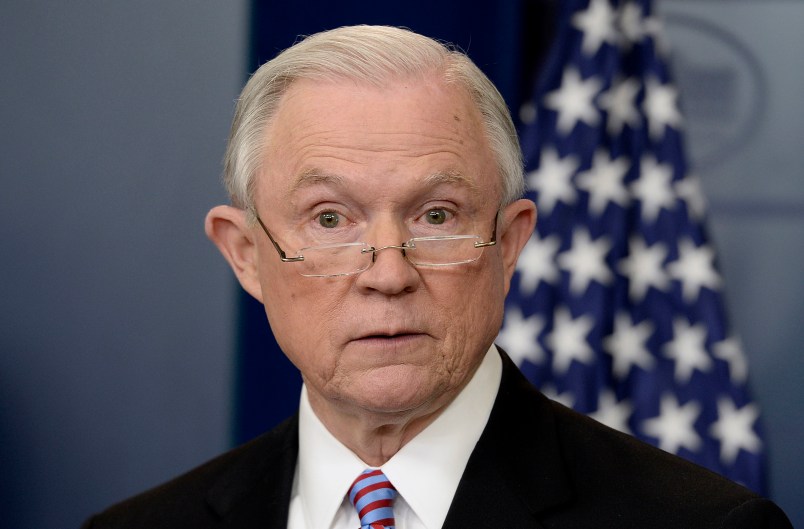Attorney General Jeff Sessions’ oversight of the federal investigation into Russian interference in the 2016 election had become “problematic” before he voluntarily recused himself, fired FBI Director James Comey testified Thursday.
The tantalizingly vague statement, based on facts Comey said he could not discuss in an open hearing of the Senate Intelligence Committee, suggested that FBI leadership knew weeks before Sessions’ recusal that he would have to step down.
As Sen. Ron Wyden (D-OR) noted, Comey first made this assertion in his seven-page-long written testimony, which was released a day before his blockbuster in-person appearance. In that prepared statement, Comey said he immediately briefed his FBI leadership team after President Donald Trump requested he drop the investigation into Trump’s freshly ousted national security adviser, Michael Flynn, in a one-on-one White House meeting on Feb. 14. The officials agreed not to notify Sessions because they expected he “would likely recuse himself from involvement in Russia-related investigations,” per Comey’s prepared statement.
“What was it about the attorney general’s own interactions with the Russians or his behavior with regard to the investigation that would have led the entire leadership of the FBI to make this decision?” Wyden asked.
“Our judgment, as I recall, was that he was very close to and inevitably going to recuse himself for a variety of reasons,” Comey said. “We also were aware of facts that I can’t discuss in an open setting, that would make his continued engagement in a Russia-related investigation problematic and so we were—we were convinced and in fact, I think we had already heard that the career people [at the Justice Department] were recommending that he recuse himself, that he was not going to be in contact with Russia related matters much longer.”
“That turned out to be the case,” he added.
Sessions recused himself two weeks after that Feb. 14 conversation between Trump and Comey, after the Washington Post reported that he failed to disclose two conversations he had with Russia’s ambassador to the U.S. during the campaign. Sessions had voluntarily offered during his own confirmation hearings that he “did not have communications with the Russians.”
After the Washington Post broke the news that Sessions twice met with Russian ambassador Sergey Kislyak, the attorney general’s spokesperson confirmed the encounters, saying they occurred in his capacity as a then-senator from Alabama rather than as a prominent Trump campaign surrogate.
The attorney general announced his recusal from both the Russia probe and any “matters that deal with the Trump campaign” hours later.
“My staff recommended recusal,” Sessions said in a March 2 news conference. “I believe those recommendations are right and just.”
During that announcement, Sessions declined to confirm that there was an investigation into Trump’s associates and Russia. He also said he did not “believe” he had met with any Russian officials other than Kislyak.
Trump is reportedly still seething at Sessions over that recusal, which he believes ultimately led to the appointment of a special counsel to oversee the sprawling Russia investigation.







Trump seems to constantly seethe about one thing or another all his waking hours, and he gets little sleep. It must be exhausting. Maybe that’s why he can’t learn the basics of how to be president.
Um. What was the then-senator from Alabama talking to Sergey Kislyak about?
The Shadow knows.
Heh heh heh.
Great old radio show reference. But the old intro from The Whistler might be even better…
(As a kid, I used to listen to rebroadcasts of that show on the Golden Days of Radio show on AFN…)
The repeated reporting that Sessions recused himself because he lied to Pence is, I assume , wrong. Seems much more complex and sinister after today’s testimony.